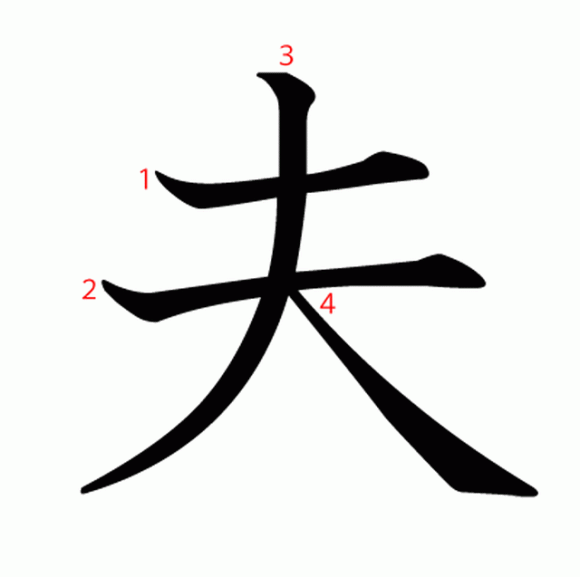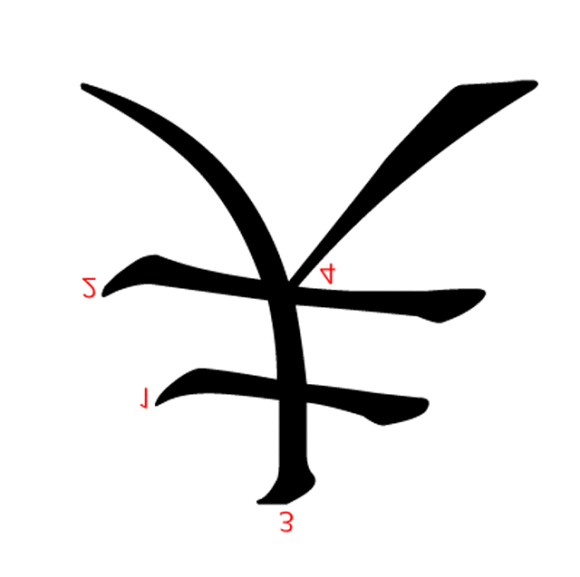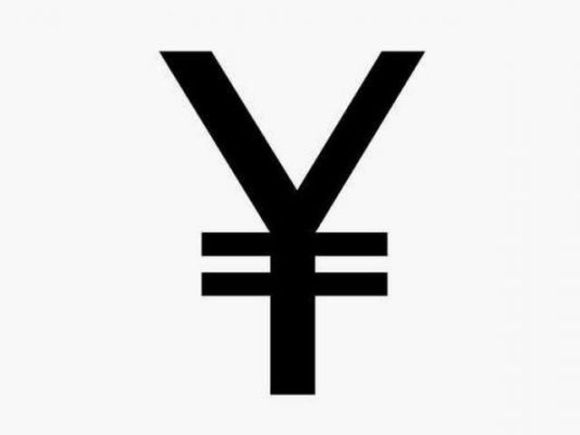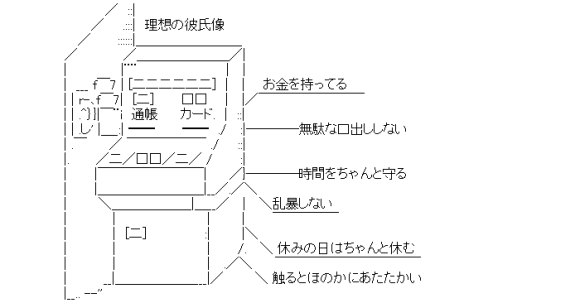
The common stereotype about women among sexually frustrated, mostly parents’ basement-dwelling, men is that girls only go for attractive, rich guys, and never the nice, tender guys with warm hearts and chic fedoras.
Well, when it comes to one of those observations, anyway, there appears to be at least one cultural precedent of a diabolical hidden message that seemingly proves the stereotype right in one of the very words that defines men and women’s relationship in Japan…
At this top of this page, you’ll see the the kanji character for husband (“otto”), which is commonly used to describe someone’s husband indirectly (women tend to directly refer to their husbands by pet names, the most common being, “anata,” which loosely translated means something like, “Hey, you over there.”). It’s a fairly simple character and one that Japanese learners meet not too far into their studies. So far, so unremarkable.
But let’s see what happens when we flip it upside-down:
▼ Hey, doesn’t that look a bit like…
▼ Well, this is awkward.
And, lest you think this is totally a coincidence that a vertically flipped “husband” should come out as the symbol for Japan’s currency, there’s actually a relatively common Japanese Internet joke that the perfect boyfriend or husband in Japan is…an ATM.
“Has money, never talks back, always on time, never forceful, doesn’t work on holidays, warm to the touch.”
So, the resemblance is a little eerie, to be sure, but there’s actually no deeper purpose here outside of a funny Internet meme, mostly because the Japanese don’t actually even use the yen symbol unless dealing with foreigners. They typically go for the native en (円) except maybe for when talking about international currency exchanges or something. History – insofar as I had time to Google – is pretty unclear about the¥symbol’s origins or whether it was devised by a Japanese or non-Japanese person.
The most commonly accepted theory, of course, is that it’s just a Y for “yen” with two lines through it – because that’s, like, just what you do with currency symbols – because in native Japanese it’s sometimes pronounced “en” and sometimes pronounced “yen” depending on the numbers that precede it, which was apparently terribly confusing to old-timey foreigners.
So, rest assured guys; this doesn’t mean Japanese women see yen signs whenever they look at men and probably aren’t waiting on proposals from ATMs.
Source: alfalfalfa
Feature image: Kanji Jiten




 Japan slowly begins to openly discuss crossdressing men in heterosexual relationships
Japan slowly begins to openly discuss crossdressing men in heterosexual relationships Foreigners misreading Japanese kanji of “two men one woman” is too pure for Japanese Internet
Foreigners misreading Japanese kanji of “two men one woman” is too pure for Japanese Internet Japanese mothers react to being called by their first names after years of just being “Mama”
Japanese mothers react to being called by their first names after years of just being “Mama” “But we’re speaking Japanese!”: Humorous video confronts lingering stereotypes in Japan
“But we’re speaking Japanese!”: Humorous video confronts lingering stereotypes in Japan 6 surprising things about having a baby in Japan
6 surprising things about having a baby in Japan Tokyo Tsukiji fish market site to be redeveloped with 50,000-seat stadium, hotel, shopping center
Tokyo Tsukiji fish market site to be redeveloped with 50,000-seat stadium, hotel, shopping center Japanese ramen restaurants under pressure from new yen banknotes
Japanese ramen restaurants under pressure from new yen banknotes Red light district sushi restaurant in Tokyo shows us just how wrong we were about it
Red light district sushi restaurant in Tokyo shows us just how wrong we were about it McDonald’s new Happy Meals offer up cute and practical Sanrio lifestyle goods
McDonald’s new Happy Meals offer up cute and practical Sanrio lifestyle goods Pokémon Sleep camping suite and guestrooms coming to Tokyo Hyatt along with giant Snorlax burgers
Pokémon Sleep camping suite and guestrooms coming to Tokyo Hyatt along with giant Snorlax burgers New private rooms on Tokaido Shinkansen change the way we travel from Tokyo to Kyoto
New private rooms on Tokaido Shinkansen change the way we travel from Tokyo to Kyoto Beautiful Red and Blue Star luxury trains set to be Japan’s new Hokkaido travel stars
Beautiful Red and Blue Star luxury trains set to be Japan’s new Hokkaido travel stars Japanese chiffon sandwiches are a treat worth travelling for
Japanese chiffon sandwiches are a treat worth travelling for Mt. Koya planning to instate visitor’s tax to cope with huge tourist numbers
Mt. Koya planning to instate visitor’s tax to cope with huge tourist numbers Starbucks Japan adds a Motto Frappuccino to the menu for a limited time
Starbucks Japan adds a Motto Frappuccino to the menu for a limited time All-you-can-drink Starbucks and amazing views part of Tokyo’s new 170 meter-high sky lounge
All-you-can-drink Starbucks and amazing views part of Tokyo’s new 170 meter-high sky lounge More foreign tourists than ever before in history visited Japan last month
More foreign tourists than ever before in history visited Japan last month Starbucks reopens at Shibuya Scramble Crossing with new look and design concept
Starbucks reopens at Shibuya Scramble Crossing with new look and design concept Studio Ghibli releases new action figures featuring Nausicaä of the Valley of the Wind characters
Studio Ghibli releases new action figures featuring Nausicaä of the Valley of the Wind characters French Fries Bread in Tokyo’s Shibuya becomes a hit on social media
French Fries Bread in Tokyo’s Shibuya becomes a hit on social media Studio Ghibli glasses cases let anime characters keep an eye on your spectacles
Studio Ghibli glasses cases let anime characters keep an eye on your spectacles Is the new Shinkansen Train Desk ticket worth it?
Is the new Shinkansen Train Desk ticket worth it? Beautiful Ghibli sealing wax kits let you create accessories and elegant letter decorations【Pics】
Beautiful Ghibli sealing wax kits let you create accessories and elegant letter decorations【Pics】 Studio Ghibli releases Kiki’s Delivery Service chocolate cake pouches in Japan
Studio Ghibli releases Kiki’s Delivery Service chocolate cake pouches in Japan New definition of “Japanese whiskey” goes into effect to prevent fakes from fooling overseas buyers
New definition of “Japanese whiskey” goes into effect to prevent fakes from fooling overseas buyers Our Japanese reporter visits Costco in the U.S., finds super American and very Japanese things
Our Japanese reporter visits Costco in the U.S., finds super American and very Japanese things Studio Ghibli unveils Mother’s Day gift set that captures the love in My Neighbour Totoro
Studio Ghibli unveils Mother’s Day gift set that captures the love in My Neighbour Totoro Domino’s Japan now sells…pizza ears?
Domino’s Japan now sells…pizza ears? New Japanese KitKat flavour stars Sanrio characters, including Hello Kitty
New Japanese KitKat flavour stars Sanrio characters, including Hello Kitty New Pokémon cakes let you eat your way through Pikachu and all the Eevee evolutions
New Pokémon cakes let you eat your way through Pikachu and all the Eevee evolutions Sales of Japan’s most convenient train ticket/shopping payment cards suspended indefinitely
Sales of Japan’s most convenient train ticket/shopping payment cards suspended indefinitely Sold-out Studio Ghibli desktop humidifiers are back so Totoro can help you through the dry season
Sold-out Studio Ghibli desktop humidifiers are back so Totoro can help you through the dry season Japanese government to make first change to romanization spelling rules since the 1950s
Japanese government to make first change to romanization spelling rules since the 1950s Ghibli founders Toshio Suzuki and Hayao Miyazaki contribute to Japanese whisky Totoro label design
Ghibli founders Toshio Suzuki and Hayao Miyazaki contribute to Japanese whisky Totoro label design Doraemon found buried at sea as scene from 1993 anime becomes real life【Photos】
Doraemon found buried at sea as scene from 1993 anime becomes real life【Photos】 Tokyo’s most famous Starbucks is closed
Tokyo’s most famous Starbucks is closed One Piece characters’ nationalities revealed, but fans have mixed opinions
One Piece characters’ nationalities revealed, but fans have mixed opinions We asked a Uniqlo employee what four things we should buy and their suggestions didn’t disappoint
We asked a Uniqlo employee what four things we should buy and their suggestions didn’t disappoint Princesses, fruits, and blacksmiths: Study reveals the 30 most unusual family names in Japan
Princesses, fruits, and blacksmiths: Study reveals the 30 most unusual family names in Japan What’s funnier and more likely to make you study than poo? How about male pattern baldness?
What’s funnier and more likely to make you study than poo? How about male pattern baldness? Do Japanese superfans really want to marry their favorite idol?【Survey】
Do Japanese superfans really want to marry their favorite idol?【Survey】 We asked: “What are the hardest and best things about dating a Japanese person?”
We asked: “What are the hardest and best things about dating a Japanese person?” Survey shows how Japanese couples feel about spending so much time together sheltering in place
Survey shows how Japanese couples feel about spending so much time together sheltering in place The 10 most attractive Japanese women’s names, as chosen by dating app users
The 10 most attractive Japanese women’s names, as chosen by dating app users Japanese police ask drunk people to please stop sleeping in the middle of the street
Japanese police ask drunk people to please stop sleeping in the middle of the street Japanese women show continuing decline in how much they expect a husband to earn in survey
Japanese women show continuing decline in how much they expect a husband to earn in survey Survey reveals that secretaries in Japan say ‘no’ to these types of husband
Survey reveals that secretaries in Japan say ‘no’ to these types of husband Nike Air Mo’ Money sneakers with Japanese text and yen symbols are the coolest kicks around
Nike Air Mo’ Money sneakers with Japanese text and yen symbols are the coolest kicks around Tokyo bar offers “babysitting” service for annoying husbands and boyfriends
Tokyo bar offers “babysitting” service for annoying husbands and boyfriends Japanese ladies list top five companies whose employees they’d most/least like to date
Japanese ladies list top five companies whose employees they’d most/least like to date Japanese man surprises his busy wife with the best gift a mom can receive
Japanese man surprises his busy wife with the best gift a mom can receive The emoji you send actually say a lot about you
The emoji you send actually say a lot about you The science behind why English speakers can’t pronounce the Japanese “fu”
The science behind why English speakers can’t pronounce the Japanese “fu” Five magic Japanese phrases to know before starting a job in Japan
Five magic Japanese phrases to know before starting a job in Japan
Leave a Reply